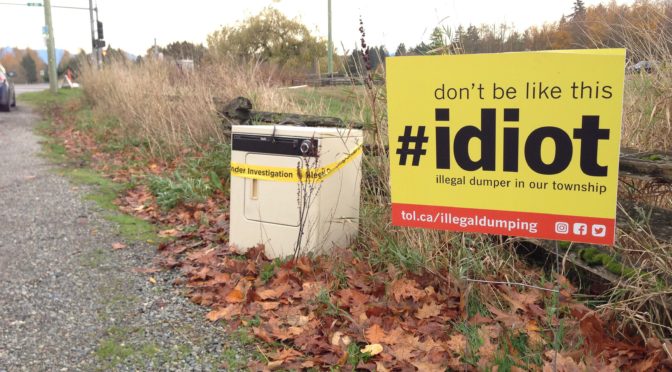On the gravel shoulder of the road sits an abandoned clothes dryer wrapped in official-looking crime scene tape bearing the words “Under Investigation.”
Beside it, a canary-yellow lawn sign screams DON’T BE LIKE THIS #IDIOT. This curious tableau did what it was meant to do: It caught my eye and stirred my imagination.
I hardly expected such roadside drama from the rural Township of Langley, but the Township’s once-idyllic spaces are feeling the development crunch, pressured on all sides by the neverending suburban expansion of Surrey and Langley. Rural areas are traditional dumping grounds for cities and suburbs, for people anxious to lose their junk without the expense of tipping fees, and the area has evolved into an illegal dumping ground at an annual cost to the Township of $400,000.
Now $400,000 per year can fund a lot of parks, recreation facilities and other resident-friendly services when it’s not being used to clean up (what should be) other peoples’ problems.
Enter Ion Brand Design.
Partners David Coates and Rod Roodenburg work with municipalities, cities and communities on creating campaigns that aim to change public behaviours around issues such as organic waste management and recycling. Invited by the Township of Langley, they developed a two-part approach to address the dumping problem: 1) Discourage littering and illegal dumping by calling attention to the issue; and 2) Inspire public involvement in catching those behind the dumping.
The challenge, Coates said, would be to come up with a concept that sticks.
We knew being authoritative – commanding people “Do Not Dump” – doesn’t work in these kinds of campaigns. We wanted to be edgy and funny. We came up with the acronym IDIOT, which stands for “Illegal Dumper In Our Township” and we figured it wouldn’t be contentious to call illegal dumpers “idiots.”
The IDIOT campaign would be “a bold statement for a big problem” according to Ryan Schmidt, Manager of Energy and Solid Waste for the Township.
With the slogan in place, Coates and Roodenburg drew up extensive campaign guidelines that included t-shirts, videos, signs for the sides of garbage trucks and, of course, the yellow emergency tape and and lawn signs. They recommended tagging and rotating a used couch and old clothes dryer across the Township, introducing them to key roadside locations that would reach the most drive-through traffic. The methods of implementation were at the discretion of the Township who could control the budget.
If the volume of direct feedback, editorials, and news stories is a reliable metric, Ion’s ideas have been wildly successful in raising awareness of the illegal dumping problem.
Whether the #IDIOT campaign, including whistleblowing and fines, has a longterm impact on the reduction of illegal dumping requires more time to assess. Implementation of additional supportive Township strategies could be necessary to address all of the underlying systemic issues that keep people from “doing the right thing.”
